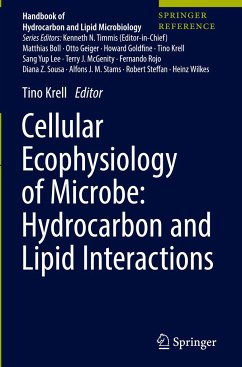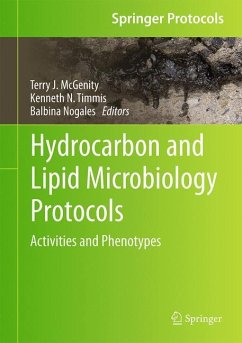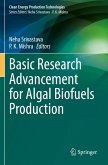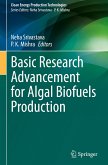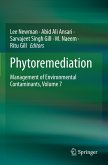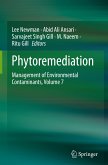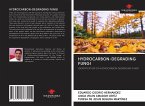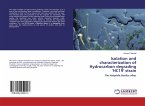Cellular Ecophysiology of Microbe: Hydrocarbon and Lipid Interactions
Herausgegeben:Krell, Tino
Cellular Ecophysiology of Microbe: Hydrocarbon and Lipid Interactions
Herausgegeben:Krell, Tino
- Gebundenes Buch
- Merkliste
- Auf die Merkliste
- Bewerten Bewerten
- Teilen
- Produkt teilen
- Produkterinnerung
- Produkterinnerung
This book assembles concisely written chapters by world-leaders in the field summarizing recent advances in understanding microbial responses to hydrocarbons. Subjects treated include mechanisms of sensing, hydrocarbon tolerance and degradation as well as an overview on hydrophobic modification of biomolecules. Other chapters are dedicated to issues related to the reduced bioavailability of hydrocarbons, which differentiates this class of compounds form many others, but which of central importance to understand the ecophysiological consequences. This book should be standard literature in any laboratory working in this area.…mehr
Andere Kunden interessierten sich auch für
![Hydrocarbon and Lipid Microbiology Protocols Hydrocarbon and Lipid Microbiology Protocols]() Hydrocarbon and Lipid Microbiology Protocols74,99 €
Hydrocarbon and Lipid Microbiology Protocols74,99 €![Basic Research Advancement for Algal Biofuels Production Basic Research Advancement for Algal Biofuels Production]() Basic Research Advancement for Algal Biofuels Production189,99 €
Basic Research Advancement for Algal Biofuels Production189,99 €![Basic Research Advancement for Algal Biofuels Production Basic Research Advancement for Algal Biofuels Production]() Basic Research Advancement for Algal Biofuels Production147,99 €
Basic Research Advancement for Algal Biofuels Production147,99 €![Phytoremediation Phytoremediation]() Phytoremediation125,99 €
Phytoremediation125,99 €![Phytoremediation Phytoremediation]() Phytoremediation125,99 €
Phytoremediation125,99 €![HYDROCARBON-DEGRADING FUNGI HYDROCARBON-DEGRADING FUNGI]() Eduardo Osorio HernandezHYDROCARBON-DEGRADING FUNGI18,99 €
Eduardo Osorio HernandezHYDROCARBON-DEGRADING FUNGI18,99 €![Isolation and characterization of Hydrocarbon degrading 'HC19' strain Isolation and characterization of Hydrocarbon degrading 'HC19' strain]() Himani ChandelIsolation and characterization of Hydrocarbon degrading 'HC19' strain27,99 €
Himani ChandelIsolation and characterization of Hydrocarbon degrading 'HC19' strain27,99 €-
-
-
This book assembles concisely written chapters by world-leaders in the field summarizing recent advances in understanding microbial responses to hydrocarbons. Subjects treated include mechanisms of sensing, hydrocarbon tolerance and degradation as well as an overview on hydrophobic modification of biomolecules. Other chapters are dedicated to issues related to the reduced bioavailability of hydrocarbons, which differentiates this class of compounds form many others, but which of central importance to understand the ecophysiological consequences.
This book should be standard literature in any laboratory working in this area.
This book should be standard literature in any laboratory working in this area.
Produktdetails
- Produktdetails
- Cellular Ecophysiology of Microbe
- Verlag: Springer / Springer International Publishing / Springer, Berlin
- Artikelnr. des Verlages: 978-3-319-50540-4
- 1st ed. 2018
- Seitenzahl: 620
- Erscheinungstermin: 10. April 2018
- Englisch
- Abmessung: 241mm x 160mm x 37mm
- Gewicht: 1026g
- ISBN-13: 9783319505404
- ISBN-10: 3319505408
- Artikelnr.: 46982548
- Cellular Ecophysiology of Microbe
- Verlag: Springer / Springer International Publishing / Springer, Berlin
- Artikelnr. des Verlages: 978-3-319-50540-4
- 1st ed. 2018
- Seitenzahl: 620
- Erscheinungstermin: 10. April 2018
- Englisch
- Abmessung: 241mm x 160mm x 37mm
- Gewicht: 1026g
- ISBN-13: 9783319505404
- ISBN-10: 3319505408
- Artikelnr.: 46982548
Tino Krell has studied Biochemistry in Leipzig (Germany) and did his PhD at the University of Glasgow (UK). He was then appointed laboratory head in the R & D Department of Sanofi Pasteur, S.A. in France. In 2004 he moved to Spain to work for the governmental research body CSIC, where he established a laboratory on bacterial sensing and signal transduction. He has investigated molecular mechanisms by which hydrocarbons are sensed by bacteria in the context of their expulsion, degradation or chemotaxis.
Adaptation to Varying Substrate Concentrations and Mixtures.- Amphiphilic Lipids, Signaling Molecules and Quorum Sensing.- Bacterial Signal Transduction Processes Based on Acetylation.- Biochemistry of Methylation of DNA.- Biofilm Development at Interfaces between Hydrophobic Organic Compounds and Water.- Biofilm Stress Responses Associated to Aromatic Hydrocarbons.- Bioinformatic, Molecular and Genetic Tools for Exploring Genome-wide Responses to Hydrocarbons.- Causes and Biochemistry of DNA Damage by Alkylation.- Chemotaxis to Hydrocarbons.- Cis-Trans Isomerase of Unsaturated Fatty Acids: An Immediate Bacterial Adaptive Mechanism to Cope with Emerging Membrane Perturbation Caused by Toxic Hydrocarbons.- DNA Methylation in Eukaryotes: Regulation and Function.- DNA Methylation in Prokaryotes: Regulation and Function.- Extrusion Pumps for Hydrocarbons: An Efficient Evolutionary Strategy to Confer Resistance to Hydrocarbons.- Fatty Acids as Mediators of Intercellular Signalling.- Feast: Choking on Acetyl-CoA, the Glyoxylate Shunt, and Acetyl-CoA-Driven Metabolism.- Fungi as Transport Vectors for Contaminants and Contaminant-Degrading Bacteria.- Genetics of Sensing, Accessing, and Exploiting Hydrocarbons.- Genomic Response of Pseudomonas putida to Toluene.- Hydrophobic Modifications of Biomolecules: An Introduction.- Kinetics and Physiology at Vanishingly Small Substrate Concentrations.- Lipidation of Other Biomolecules and Functions.- Lipids as Signalling Molecules in Eukaryotes.- Matrix-Hydrophobic Compound Interactions.- Membrane Adaptations to Low Water Two-Phase Bioprocess Systems.- Membrane Composition and Modifications in Response to Aromatic Hydrocarbons in Gram Negative Bacteria.- Microbiology of Oil Fly Larvae.- Microorganism-Hydrophobic Compound Interactions.- Mutagenic Consequences of Alkylation.- Nitrogen Fixation and Hydrocarbon-Oxidizing Bacteria.- One-Component Systems that Regulate the Expression of Degradation Pathways for Aromatic Compounds.- Problems of Feast or Famine: An Introduction:.- Problems of Hydrophobicity/Bioavailability: An Introduction.- Problems of Solventogenicity, Solvent Tolerance: An Introduction.- Production and Roles of Biosurfactants and Bioemulsifiers in Accessing Hydrophobic Substrates.- Protein Alkylation.- Protein Lipidation in Eukaryotes: Biochemistry and Function.- Protein Lipidation in Prokaryotes: Biochemistry and Function.- Protein Methylation in Bacteria.- Sensing, Signaling and Uptake: An Introduction.- Strategies to Increase Bioavailability and Uptake of Hydrocarbons.- Substrate Transport.- Surface Properties and Cellular Energetics of Bacteria in Response to the Presence of Hydrocarbons.- The Family of Two-Component Systems that Regulate Hydrocarbon Degradation Pathways.- The Potential of Hydrocarbon Chemotaxis to Increase Bioavailability and Biodegradation Efficiency.- Toxicity of Hydrocarbons to Microorganisms.- Transcriptional Regulation of Hydrocarbon Efflux Pump Expression in Bacteria.-Ultrastructural Insights into Microbial Life at the Hydrocarbon:Aqueous Environment Interface.- Uptake and Assimilation of Hydrophobic Substrates by the Oleaginous Yeast Yarrowia lipolytica.- Water-Hydrophobic Compound Interactions with the Microbial Cell.
Adaptation to Varying Substrate Concentrations and Mixtures.- Amphiphilic Lipids, Signaling Molecules and Quorum Sensing.- Bacterial Signal Transduction Processes Based on Acetylation.- Biochemistry of Methylation of DNA.- Biofilm Development at Interfaces between Hydrophobic Organic Compounds and Water.- Biofilm Stress Responses Associated to Aromatic Hydrocarbons.- Bioinformatic, Molecular and Genetic Tools for Exploring Genome-wide Responses to Hydrocarbons.- Causes and Biochemistry of DNA Damage by Alkylation.- Chemotaxis to Hydrocarbons.- Cis-Trans Isomerase of Unsaturated Fatty Acids: An Immediate Bacterial Adaptive Mechanism to Cope with Emerging Membrane Perturbation Caused by Toxic Hydrocarbons.- DNA Methylation in Eukaryotes: Regulation and Function.- DNA Methylation in Prokaryotes: Regulation and Function.- Extrusion Pumps for Hydrocarbons: An Efficient Evolutionary Strategy to Confer Resistance to Hydrocarbons.- Fatty Acids as Mediators of Intercellular Signalling.- Feast: Choking on Acetyl-CoA, the Glyoxylate Shunt, and Acetyl-CoA-Driven Metabolism.- Fungi as Transport Vectors for Contaminants and Contaminant-Degrading Bacteria.- Genetics of Sensing, Accessing, and Exploiting Hydrocarbons.- Genomic Response of Pseudomonas putida to Toluene.- Hydrophobic Modifications of Biomolecules: An Introduction.- Kinetics and Physiology at Vanishingly Small Substrate Concentrations.- Lipidation of Other Biomolecules and Functions.- Lipids as Signalling Molecules in Eukaryotes.- Matrix-Hydrophobic Compound Interactions.- Membrane Adaptations to Low Water Two-Phase Bioprocess Systems.- Membrane Composition and Modifications in Response to Aromatic Hydrocarbons in Gram Negative Bacteria.- Microbiology of Oil Fly Larvae.- Microorganism-Hydrophobic Compound Interactions.- Mutagenic Consequences of Alkylation.- Nitrogen Fixation and Hydrocarbon-Oxidizing Bacteria.- One-Component Systems that Regulate the Expression of Degradation Pathways for Aromatic Compounds.- Problems of Feast or Famine: An Introduction:.- Problems of Hydrophobicity/Bioavailability: An Introduction.- Problems of Solventogenicity, Solvent Tolerance: An Introduction.- Production and Roles of Biosurfactants and Bioemulsifiers in Accessing Hydrophobic Substrates.- Protein Alkylation.- Protein Lipidation in Eukaryotes: Biochemistry and Function.- Protein Lipidation in Prokaryotes: Biochemistry and Function.- Protein Methylation in Bacteria.- Sensing, Signaling and Uptake: An Introduction.- Strategies to Increase Bioavailability and Uptake of Hydrocarbons.- Substrate Transport.- Surface Properties and Cellular Energetics of Bacteria in Response to the Presence of Hydrocarbons.- The Family of Two-Component Systems that Regulate Hydrocarbon Degradation Pathways.- The Potential of Hydrocarbon Chemotaxis to Increase Bioavailability and Biodegradation Efficiency.- Toxicity of Hydrocarbons to Microorganisms.- Transcriptional Regulation of Hydrocarbon Efflux Pump Expression in Bacteria.-Ultrastructural Insights into Microbial Life at the Hydrocarbon:Aqueous Environment Interface.- Uptake and Assimilation of Hydrophobic Substrates by the Oleaginous Yeast Yarrowia lipolytica.- Water-Hydrophobic Compound Interactions with the Microbial Cell.

